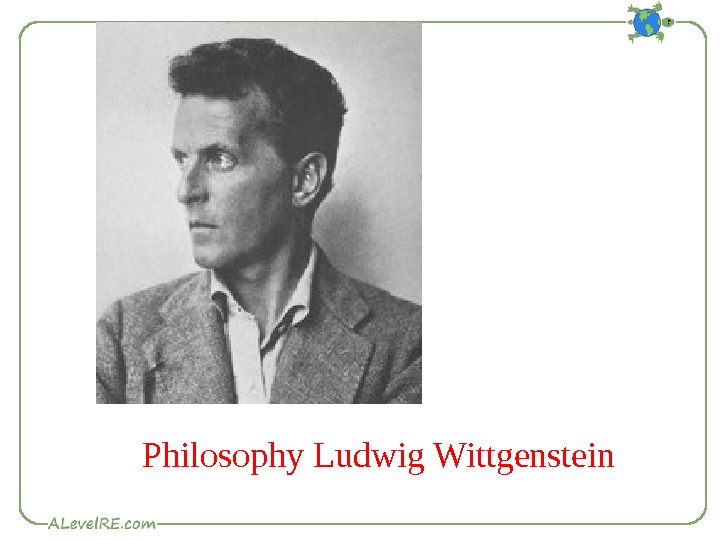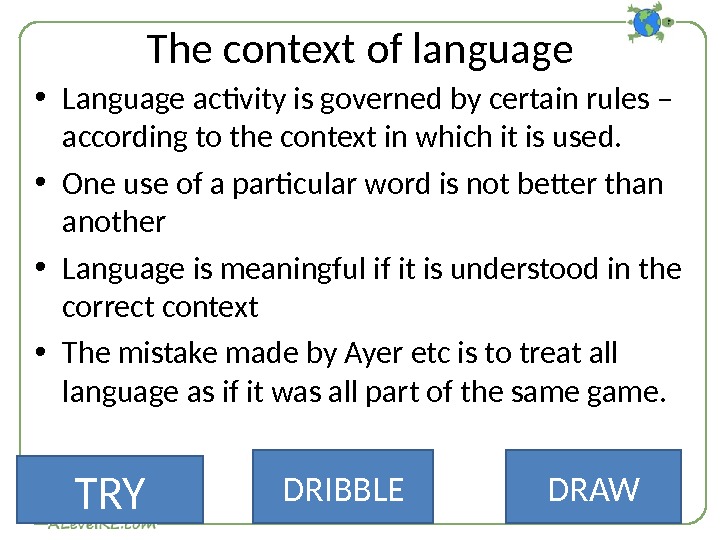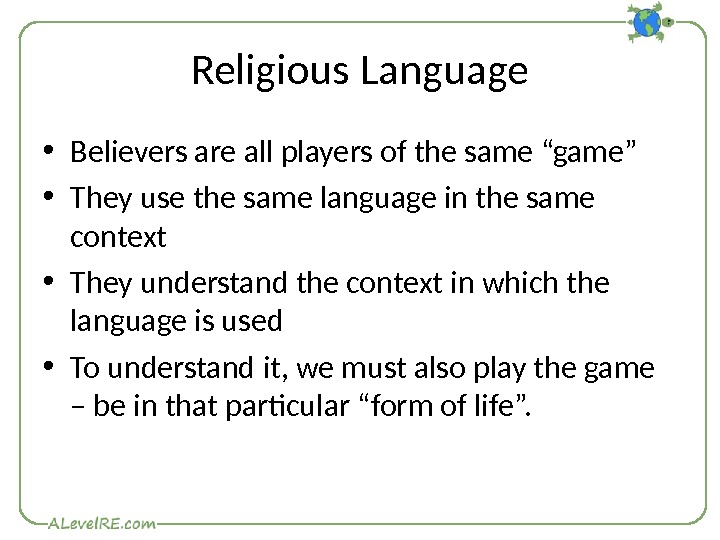Презентация wittgenstein-language-games









- Размер: 435.5 Кб
- Количество слайдов: 9
Описание презентации Презентация wittgenstein-language-games по слайдам
 Philosophy Ludwig Wittgenstein
Philosophy Ludwig Wittgenstein
 Born Ludwig Josef Johann Wittgenstein 26 April 1889 Vienna , Austria-Hungary Died 29 April 1951 (aged 62) Cambridge , England Era 20 th century philosophy School Analytic philosophy Main interests Logic , Metaphysics , Philosophy of language , Philosophy of mathematics , Philosophy of mind , Epistemology Notable ideas Picture theory of language Truth functions States of affairs Logical necessity Meaning is use Language-games Critique of set theory
Born Ludwig Josef Johann Wittgenstein 26 April 1889 Vienna , Austria-Hungary Died 29 April 1951 (aged 62) Cambridge , England Era 20 th century philosophy School Analytic philosophy Main interests Logic , Metaphysics , Philosophy of language , Philosophy of mathematics , Philosophy of mind , Epistemology Notable ideas Picture theory of language Truth functions States of affairs Logical necessity Meaning is use Language-games Critique of set theory
 Ludwig Wittgenstein EARLY: PICTURE THEORY LATER: LANGUAGE GAMES
Ludwig Wittgenstein EARLY: PICTURE THEORY LATER: LANGUAGE GAMES
 Early: Picture Theory (Logical Positivist view) • Language corresponds to a state of affairs in the world • Language can only be meaningful if it used in relation to what we see in the world • Language is a way of representing facts “ The cat is on the mat”
Early: Picture Theory (Logical Positivist view) • Language corresponds to a state of affairs in the world • Language can only be meaningful if it used in relation to what we see in the world • Language is a way of representing facts “ The cat is on the mat”
 Later: Language Games Criticised Vienna Circle – our language is far richer & more diverse than LP allow Multiplicity of language: Give orders, tell jokes, describe, report, ask, thank, curse, greet, pray etc If we want to know the meaning of the language, we need to know how it is being used – “meaning is use”
Later: Language Games Criticised Vienna Circle – our language is far richer & more diverse than LP allow Multiplicity of language: Give orders, tell jokes, describe, report, ask, thank, curse, greet, pray etc If we want to know the meaning of the language, we need to know how it is being used – “meaning is use”
 The context of language • Language activity is governed by certain rules – according to the context in which it is used. • One use of a particular word is not better than another • Language is meaningful if it is understood in the correct context • The mistake made by Ayer etc is to treat all language as if it was all part of the same game. TRY DRIBBLE DRAW
The context of language • Language activity is governed by certain rules – according to the context in which it is used. • One use of a particular word is not better than another • Language is meaningful if it is understood in the correct context • The mistake made by Ayer etc is to treat all language as if it was all part of the same game. TRY DRIBBLE DRAW
 Religious Language • Believers are all players of the same “game” • They use the same language in the same context • They understand the context in which the language is used • To understand it, we must also play the game – be in that particular “form of life”.
Religious Language • Believers are all players of the same “game” • They use the same language in the same context • They understand the context in which the language is used • To understand it, we must also play the game – be in that particular “form of life”.
 Meaning of Language “ God Exists” Wittgenstein recognises the meaning behind this statement. To a religious believer this statement means more than “there is a god”. It is a positive affirmation that they are entering into a life of faith. When a religious believer makes this statement, they are confirming their belief in God as a reality in their life – a declaration of faith Unless you are a believer, you cannot understand what this means.
Meaning of Language “ God Exists” Wittgenstein recognises the meaning behind this statement. To a religious believer this statement means more than “there is a god”. It is a positive affirmation that they are entering into a life of faith. When a religious believer makes this statement, they are confirming their belief in God as a reality in their life – a declaration of faith Unless you are a believer, you cannot understand what this means.
 Anti Realism • Wittgenstein’s approach to language is Anti-Realist. • What is meaningful is what is “true for me” • Whether God does or does not have external reality does not matter • Religious faith is an affirmative decision to “enter the game” & therefore find meaning in the language that is used accordingly • Truth is relative
Anti Realism • Wittgenstein’s approach to language is Anti-Realist. • What is meaningful is what is “true for me” • Whether God does or does not have external reality does not matter • Religious faith is an affirmative decision to “enter the game” & therefore find meaning in the language that is used accordingly • Truth is relative
